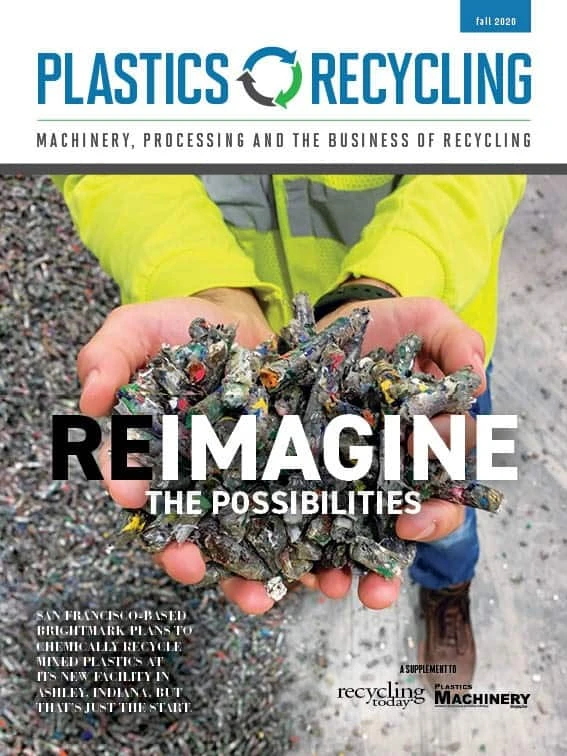Thermoset plastic recycling method. Thermoset plastic scrap deemed to be unrecyclable could be a new frontier in the circular economy in light of a new, continuous process patented by a Hong Kong company that specializes in advanced materials. According to the patent, the process produces recycled resins that have characteristics similar to virgin materials.
“Thermoplastic resins can be fluidized by heating so that they can be remolded and reused as raw materials for further production,” Nano and Advanced Materials Institute Ltd. states in its patent. “On the contrary, thermoset wastes, which contribute to nearly half of all plastic wastes, are impossible to recycle. The most challenging point of recycling thermoset wastes is that they cannot be fluidized through conventional heating methods due to the dense structure of their three-dimensional network.”
To overcome these challenges, the company proposes a process that uses a combination of pressure, heat and a supercritical solvent to decrosslink thermosets, such as crosslinked polyethylene (XLPE), XLPE foam and phenolic or epoxy resins.
To begin the process, recyclers crush thermoset scrap and clean it using a cleaning agent and filtration. Then, they feed it into an extruder. Using temperatures of up to 750 F and extrusion pressures of up to 150 bar, the scrap can be recycled, according to the patent.
“[The] crosslinking structure between macromolecules in the thermoset plastic waste is broken down to obtain decrosslinked thermoset waste by the supercritical solvent so that the decrosslinked thermoset waste is continuously extruded out from the extruder,” the patent states.
A single-screw extruder can perform the process without need of a second extruder. In some cases, the material spends less than 5 minutes in the extruder before it is entirely broken down. Faster screw speeds ensure shorter dwell times, and the patent states, “decrosslinking efficiency is improved when the extrusion temperature and pressure make the liquid solvent achieve the supercritical condition.”

The patent characterizes the process as a harmless and effective strategy suitable for mass recycling, unlike previous approaches that have been expensive or dangerous to the environment. Resins produced by the process can be returned to the manufacturing process. “The pelletized thermoset plastic waste is reused as raw materials to replace the same virgin plastics for manufacturing,” the patent says.
Patent 10,774,193; issued Sept. 15
Depolymerization. The diversity of products that contain polyethylene (PE), polypropylene (PP) and polystyrene (PS) and the varying levels of additives make recycling difficult. But a company that produces waxes, additives and other chemicals from recycled plastics has patented an approach to extract more value from scrap PE, PP and PS. The process, patented by GreenMantra Recycling Technologies Ltd., Brantford, Ontario, involves heating plastic scrap with a solvent in a reaction vessel, in some cases to temperatures of up to 800 F. The reaction vessel is depressurized to remove contaminants suspended in the solvent, and the remaining materials are cooled.
“Supercritical Fluid Extraction has the potential to efficiently remove contaminants from polymers without a risk of thermal oxidation and/or degradation of the polymer material,” according to Green- Mantra’s patent.
In addition to PE, PP and PS, the process could be used to derive value from scrap ethylene vinyl acetate, polyethylene terephthalate and polyvinyl chloride, as well as from virgin and recycled plastics. “Suitable waste plastic material feeds can include, but are not limited to, mixed polyethylene waste, mixed polypropylene waste and/or a mixture, including mixed polyethylene waste and mixed polypropylene waste,” and products such as plastic bags, milk containers, pails, caps, agricultural film and packaging material, the patent states.
Some of the products that can be made from the depolymerized plastics include surface polishers and protectants, adhesives, lubricants, asphalts, inks, coatings, extruded products, plastic composites, emulsions and binders.
Patent 10,723,858; issued July 28

Explore the Fall 2020 Plastics Recycling Issue
Check out more from this issue and find your next story to read.
Latest from Recycling Today
- AF&PA report shows decrease in packaging paper shipments
- GreenMantra names new CEO
- Agilyx says Styrenyx technology reduces carbon footprint in styrene production
- SABIC’s Trucircle PE used for greenhouse roofing
- Hydro to add wire rod casthouse in Norway
- Hindalco to invest in copper, aluminum business in India
- Recycled steel price crosses $500 per ton threshold
- Smithers report looks at PCR plastic’s near-term prospects





